By Henrietta Appleton, Policy Officer (England)
How often do you read that policy must be science and evidence-led, and think that must be good, leading to the right conclusion? Sadly that is not always the case. Of course, it’s not always easy, and sometimes evidence is conflicting anyway but it’s concerning when aspects of environmental policy are being (or have been) formulated based on evidence that is questionable in terms of its methodology and reliability, or where robust evidence is ignored for political expediency.
Why is this important?
Scientific evidence underpins the formulation and evaluation of policy measures across all sectors from health to industry, agriculture and wildlife conservation. Consequently ‘scientific evidence’ is referred to widely without, arguably, much consideration of what this actually means.
But not all scientific evidence is the same in terms of quality or validity and therefore reliability, which is important if directly impacting on decision making. Last year I attended a workshop hosted by the Conservation Evidence Group at Cambridge University where the importance of study design in the effectiveness of conservation measures on the accuracy of outcomes was highlighted. Although high quality studies are expensive and often longer term, they are likely to produce better policy outcomes particularly in the world of nature conservation.

The nature of ecological cycles means that timescales can have a significant bearing on the outcomes – the carbon cycle of woodland or peatland, acting over decades or even centuries, is an example of this. Furthermore, environmental processes often cannot easily be isolated, so that the relative importance of different influences is difficult to evaluate, some of which may not become apparent in short-term studies. This is emphasised by the Conservation Evidence database website which states: “We do not make recommendations. This is because it is difficult to give evidence-based conservation advice that is appropriate for every context”. Consequently, policy that legislates for binary outcomes is likely to result in unintended consequences. A good example of this is the current discussion around the introduction of a closed season in England for brown hares. The measure, intended to improve the welfare of leverets, fails to consider the possible impacts on the population as a whole of removing the ability of farmers to protect precision-drilled crops from damage during a short vulnerable interval which coincides with the breeding season. Taking disproportionate pre-emptive action during the open season then becomes the only crop protection option.
It should be a reasonable assumption that the best scientists will publish in the best journals. But the proliferation and commercialisation of scientific journals have led to problems due to the sheer volume of science (according to The Guardian an estimated 48% increase in research studies between 2015 and 2024) that needs to be reviewed/collated to understand the complexities of a policy proposal. Given that scientific careers are now being defined by the number of papers published and citations received, there is genuine concern that the financial interests of the publishing world are doing little to advance scientific knowledge. Indeed some journals now require authors to pay to place their papers indicating that readership income alone is insufficient to make the journal viable.
This also has other implications. If quantity is the measure rather than quality, then the ‘weight of scientific evidence’ could produce a result that is not as effective as a single piece of quality research. In some cases, it has also led to a scientist who is producing different results being seen as an ‘outlier’. Yet as Lord Krebs said in a debate on the Genetic Technology (Precision Breeding) Bill “scientists do not agree on everything […] when there is a centre of gravity of opinion, there are always outliers. Sometimes those outliers turn out to be right and there are transformations”. There is also the potential for bias as some topics are more ‘acceptable’ and therefore in demand to meet policy trends. This could mean that some science is harder to get published or funded. As a Financial Times article from 2007 said: “Science is a matter of evidence, not what a majority of scientists think”.

Is evidence-led policy therefore possible?
Back in 2004, a Cabinet Office paper highlighted the influence of other factors in policy formulation such as values and beliefs, the influence of pressure groups and the experience of policymakers. It is the distortion presented by ideologies and political agendas that presents most concern. Professor Allan Britton, an international lawyer in a LinkedIn article in February 2024, said: “There is a real danger that scientific facts will be cherry-picked, oversimplified, or intentionally misconstrued to serve political agendas.” It is, therefore, incumbent on scientists to call out cases of factual distortion – something we often do in our blogs – and on politicians to use robust evidence to improve policy.
The influence of values and beliefs on policy can be a frustration as ultimately all stakeholders and interested parties have similar if not the same priorities. In conservation, it is the protection and restoration of nature. Differences usually come down to the diversity of approaches in achieving this with some considered less palatable to the public than others. Yet in our increasingly challenged landscape there needs to be room for all approaches to conservation that are evidence-led. In such situations surely conservation values based on science should outweigh public values based on emotions.
In answer to my question regarding the ability to produce evidence-led policy; there is general concern that scientific integrity is being undermined. Continued engagement and dialogue between research and policy is vital and I hope that objective scientific evidence, such as that produced by the GWCT, will prevail over ideological advocacy.